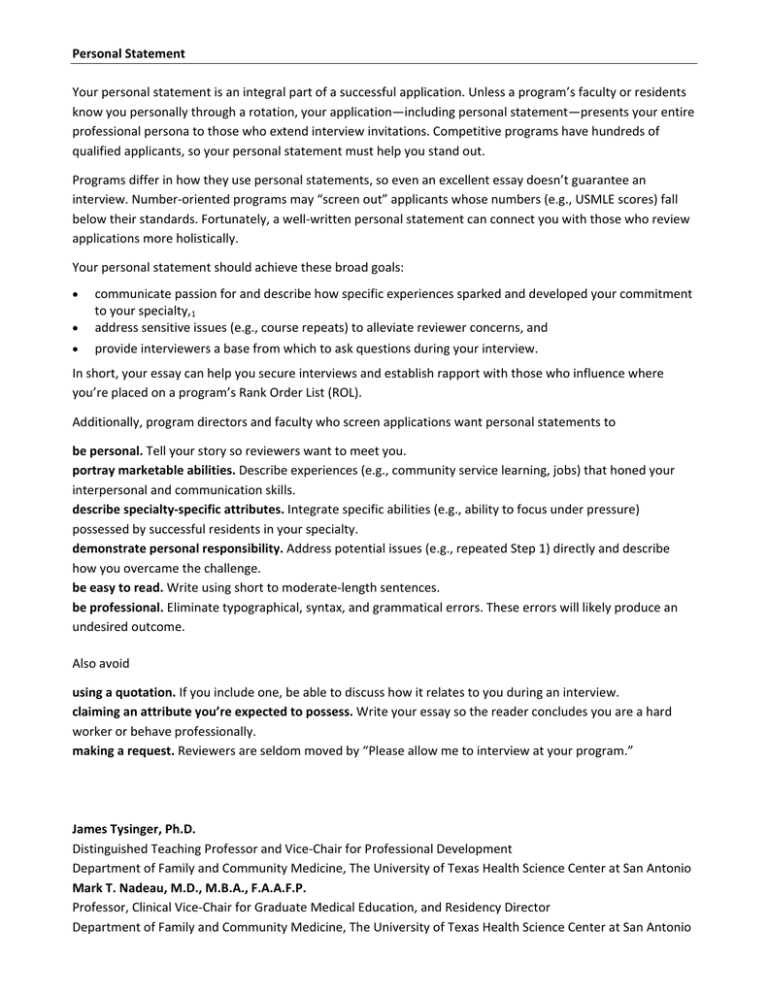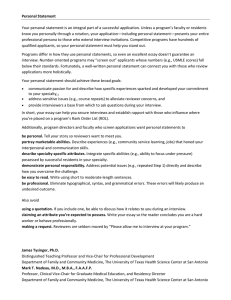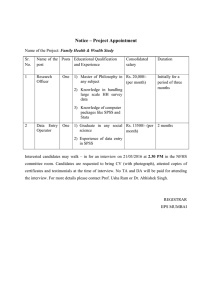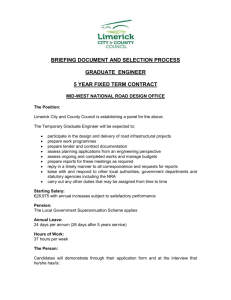Personal Statement Your personal statement is an integral part of a successful application. Unless a program’s faculty or residents
advertisement

Personal Statement Your personal statement is an integral part of a successful application. Unless a program’s faculty or residents know you personally through a rotation, your application—including personal statement—presents your entire professional persona to those who extend interview invitations. Competitive programs have hundreds of qualified applicants, so your personal statement must help you stand out. Programs differ in how they use personal statements, so even an excellent essay doesn’t guarantee an interview. Number‐oriented programs may “screen out” applicants whose numbers (e.g., USMLE scores) fall below their standards. Fortunately, a well‐written personal statement can connect you with those who review applications more holistically. Your personal statement should achieve these broad goals: communicate passion for and describe how specific experiences sparked and developed your commitment to your specialty,1 address sensitive issues (e.g., course repeats) to alleviate reviewer concerns, and provide interviewers a base from which to ask questions during your interview. In short, your essay can help you secure interviews and establish rapport with those who influence where you’re placed on a program’s Rank Order List (ROL). Additionally, program directors and faculty who screen applications want personal statements to be personal. Tell your story so reviewers want to meet you. portray marketable abilities. Describe experiences (e.g., community service learning, jobs) that honed your interpersonal and communication skills. describe specialty‐specific attributes. Integrate specific abilities (e.g., ability to focus under pressure) possessed by successful residents in your specialty. demonstrate personal responsibility. Address potential issues (e.g., repeated Step 1) directly and describe how you overcame the challenge. be easy to read. Write using short to moderate‐length sentences. be professional. Eliminate typographical, syntax, and grammatical errors. These errors will likely produce an undesired outcome. Also avoid using a quotation. If you include one, be able to discuss how it relates to you during an interview. claiming an attribute you’re expected to possess. Write your essay so the reader concludes you are a hard worker or behave professionally. making a request. Reviewers are seldom moved by “Please allow me to interview at your program.” James Tysinger, Ph.D. Distinguished Teaching Professor and Vice‐Chair for Professional Development Department of Family and Community Medicine, The University of Texas Health Science Center at San Antonio Mark T. Nadeau, M.D., M.B.A., F.A.A.F.P. Professor, Clinical Vice‐Chair for Graduate Medical Education, and Residency Director Department of Family and Community Medicine, The University of Texas Health Science Center at San Antonio References 1 Johnstone RE. Describing oneself: What anesthesiology residency applicants write in their personal statements. Anesth Analg. 2011;113(2):421–424. 2 ERAS Integrity Promotion—Education Program. (https://www.aamc.org/services/eras/policies/69738/integrityeducation.html). Accessed April 6, 2012. On Being a Doctor Annals of Internal Medicine In Defense of the Personal Statement A s the director of an internal medicine residency program, I read hundreds of personal statements every year. I know many program directors who find them irrelevant at best, and I confess I can’t blame them. These statements usually follow 1 of 3 scripts: The candidates relay a medical catastrophe that afflicted them or their family. Curiosity is piqued. They indulge their curiosity by poring over endless tomes of biologic sciences and end up in medical school. Or, they know that they’ve wanted to be a doctor since conception. They were always exceptionally skilled in the sciences but really wanted to help people. Medical school was the natural conclusion. Or, lastly, the curious case of Mr. X, who tells me a great deal about the unfortunate patient but surprisingly little about the candidate. All candidates then have some sort of revelation during their internal medicine clerkship, and that is how their applications arrived on my computer screen. I hate them all. Not the candidates, but their personal statements. Because there’s really very little that’s personal about them. The major thing they’ve told me about themselves is that they are very much like 90% of the other candidates for my program, or that they’ve engaged the services of whatever essay mill produces such stultifying prose. I’m not sure which is worse. I’ve felt this way ever since I had to write my own personal statements for college, medical school, and residency applications. I felt that the personal statement was a great opportunity to tell the programs how I differed from the other candidates. My scores may not have been the best, and my grades wouldn’t bowl anyone over, but my personal statement—that was an opportunity to convince the program that they should still give me a look. The one that I remember most vividly is the one I wrote for my internal medicine residency application. I wrote about growing up on a South Dakota farm in the mid-1970s, in the era before genetically modified soybeans were bred to resist some of the most potent herbicides known to man. Back then, we got rid of weeds the old-fashioned way— by hand. As 1 of 4 children, I was expected to wake up at dawn in the summer months and join the rest of the kids in our more than 100-acre soybean field, slowly trudging up and down each and every row attacking any weed we encountered, with either my hands or the blunt kitchen knife I carried. Some of the weeds were taller than I was and seemed to attract multitudes of stinging insects that I am convinced have yet to be catalogued. After 5 hours of this, we would all be glazed with some combination of sweat, dirt, and mangled insect corpses. We weren’t paid for this. Our reward was a possible trip to the public swimming pool that afternoon. (We were, by the way, probably the driving force behind why people are required to shower before entering the water.) I winced a little as I mailed my statement, hoping that I hadn’t portrayed myself as too much of a hayseed, while at the same time knowing that it was a large part of my story. This was the truth and the essence of me in 500 words or less. The response was overwhelming. Every single interviewer asked me about it, and it usually led to a spirited and satisfying conversation. One flat-out told me that he thought I was lying, and I spent the greater part of the interview convincing him otherwise. Another looked at me almost thankfully and told me it was one of the best personal statements he’d ever read. Now that I’m a program director, I think I know why. The overwhelming majority of personal statements are excruciatingly boring. It seems that our standardization of the medical school curriculum has led to a generation of physicians who feel the need to be standardized people as well, even when making statements that are by their very title intended to be personal. Give me the personal statement that describes cowering under the kitchen table during a raging kitchen fire. Give me the one that describes the conflicting feelings of having an oppositional soldier in the cross hairs, knowing that one day you may be the very medic assigned to help him. I want to hear from the candidate who appreciates the fibers of alpaca wool, the benefits of painting with oils rather than acrylics, the one who won the world clogging championships at the age of 12, or the one who worked hard at becoming a varsity football player but ended up handing out towels on the bench. These are the personal statements that convey appreciation of fear, conflicted emotions, beauty, success, and failure. These are the ones that demonstrate a feature that is still key to being a doctor: humanity. How else are we to know about this side of our candidates if not for their personal statements? And don’t even think about suggesting that we rely on the letters of recommendation: I have read far too many that are written for different individuals but are word for word identical. They’re frequently much worse than the personal statement, and for that, shame on us. Our medical students need to be encouraged to bring themselves to life in their personal statements. They need to find something—anything—that describes them as an individual. Encourage them to share their love of dogs, their fear of clowns, their culinary successes, and their camping nightmares. Tell them to present themselves as someone swimming in this ocean of life and not the buoy bobbing on top of it. For the sake of program directors everywhere, I beg this of you. Turi McNamee, MD Sanford School of Medicine of the University of South Dakota Sioux Falls, SD 57103 Requests for Single Reprints: Turi McNamee, MD, Sanford School of Medicine, 1400 West 22nd Street, Sioux Falls, SD 57103; e-mail, tmcnamee@usd.edu. Ann Intern Med. 2012;157:675. © 2012 American College of Physicians 675 Downloaded From: http://annals.org/ by a University of Minnesota User on 11/08/2012



